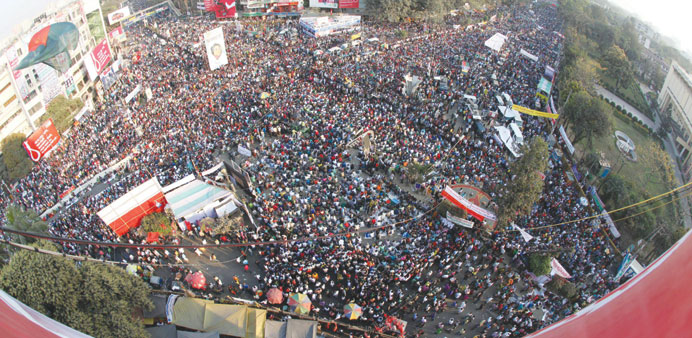Clashes between Bangladeshi police and hardline Islamists killed four people yesterday during a fresh round of protests over war crimes trials as the unrest spread to the country’s main tourist resort.
Police said violence erupted at Tarabunia in the southeastern Cox’s Bazaar region as 5,000 supporters of the opposition Jamaat-e-Islami party took to the streets to protest at the trials of their leaders by a
government-appointed court.
Jamaat supporters armed with homemade firearms and bombs and stones attacked the security forces who retaliated with
gunfire, said police officers.
“So far four people have died in the clashes,” Nur Jahan, a local police officer, said. A district administrator said three of the
deceased were Jamaat supporters.
“There were up to 5,000 protesters. They suddenly attacked us with homemade guns and bombs. We fired back in self-defence,” local police chief Jashim Uddin said, adding three of the dead were shot.
At least 13 people have now died during clashes over the ongoing trials in which a host of senior Jamaat figures — including the party’s leader and deputy leader — are being tried over their role in the 1971
independence war.
The clashes have intensified since last week after a senior Jamaat leader was sentenced by a war crimes tribunal to life
imprisonment for mass murder.
Jamaat and the main opposition Bangladesh Nationalist Party have said the trials are based on bogus charges and part of a wider political vendetta.
The government says the trials are needed to heal the wounds of the nine-month war in which it says 3mn people were killed, many by pro-Pakistani militia whose members allegedly included Jamaat officials.
Meanwhile, tens of thousands of demonstrators took to the street yesterday to demand the death penalty for people convicted of war crimes.
Both sets of protests illustrate how the country remains polarised over the events 40 years ago, despite pledges from Prime Minister Sheikh Hasina’s secular-leaning administration the war crimes tribunal would be a model to the world and heal wounds of the civil war era.
A steady stream of people including middle-class families with children have flowed into Shahbagh, a leafy boulevard in the heart of the capital Dhaka, calling for those on trial for war crimes to be hanged. These protests, which so far have not come into contact with the Islamist-led demonstrations, have remained peaceful.
The tribunal handed down its first verdict in January, sentencing in absentia a former Jamaat-e-Islami leader to death. A second ruling this month, sentencing Quader Mollah, a senior party leader, to life in jail, angered many of the protesters at Shahbagh, who say he should have been hanged.
“He was found guilty of mass murder and so the verdict of life imprisonment does not make sense,” said Asif Mohiuddin, co-ordinator of a bloggers’ network that called for the street protests. “The people demand justice for the victims of 1971.”
Yesterday, demonstrators waved flags, sang patriotic songs and danced in Shahbag, emboldened by the large numbers. Many wore headbands and carried placards with slogans such as “Hang all Razakars (Islamists).”
While Islamist parties draw support in rural areas, many middle-class urban dwellers, usually secular in outlook, back the call for harsher sentences.
The Awami League-led government of Sheikh Hasina has moved to meet the protesters’ demands. Hasina has been quoted in Bangladesh’s media this week as saying judges should take popular sentiment into account when formulating
decisions.
Although most protesters at Shahbagh were born after the war, many seem convinced of the Islamists’ guilt.
“We’re not legal experts,” said Parvez Alam, a well-known blogger and one of the co-ordinators of the group that organised the protests. “The people have raised the demand that all war criminals must receive maximum punishment. It’s up to the government and courts to execute the people’s verdict.”
The protests have dominated the news agenda in Bangladesh, garnering largely positive coverage. Commentators have noted the large numbers reflect disappointment with constant political instability, corruption and economic stagnation.
But some observers have criticised what they see as the
gathering’s narrow focus.
“It’s great that people are coming together, and there is no doubt that those convicted of war crimes should be severely punished,” said Shahana Siddiqui, a writer and development activist. “But this is the time for us to channel our energy into stronger democratic practices, not just scream for blood and
revenge.”

